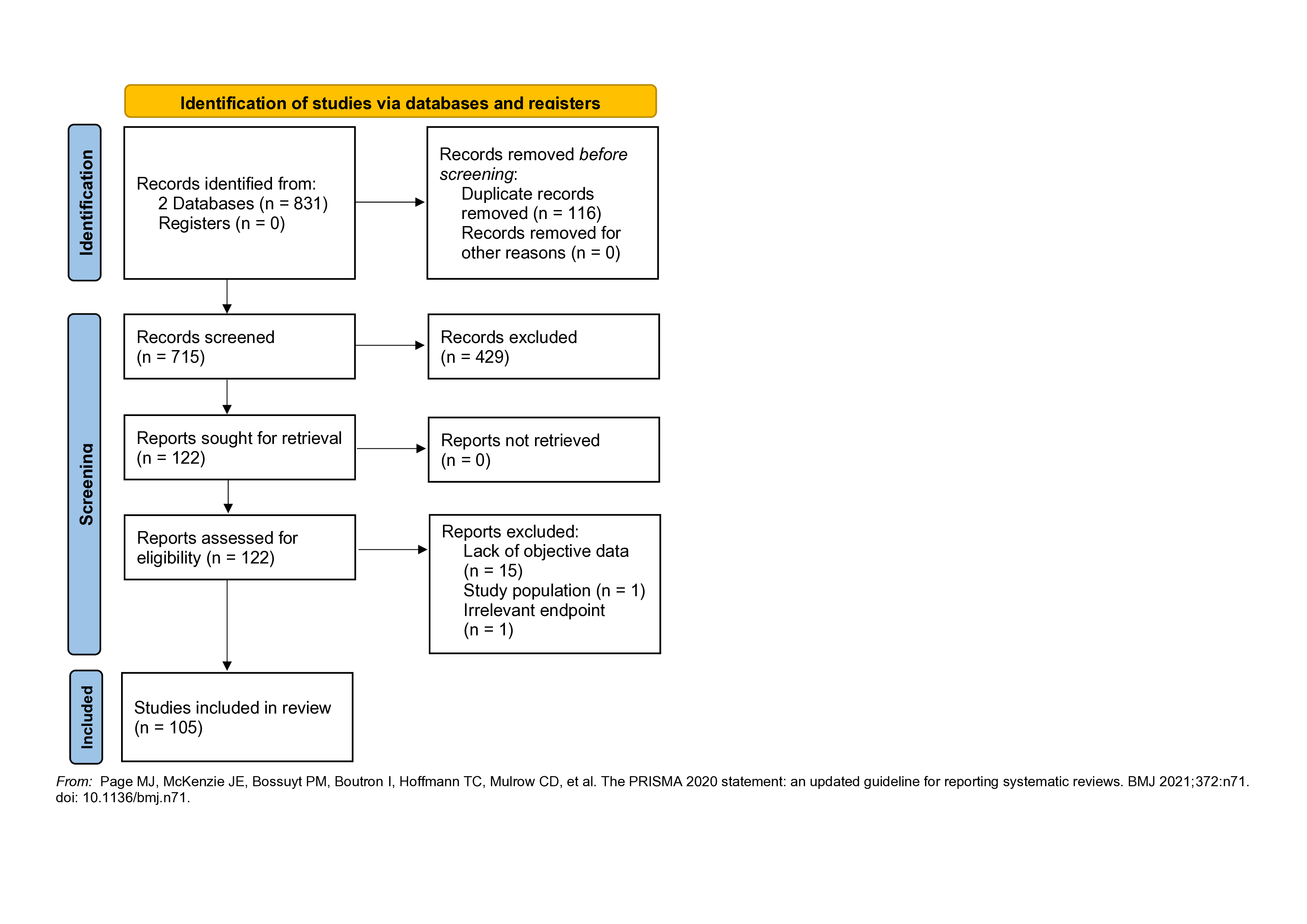Session Information
Date: Monday, October 27, 2025
Title: (1306–1346) Rheumatoid Arthritis – Diagnosis, Manifestations, and Outcomes Poster II
Session Type: Poster Session B
Session Time: 10:30AM-12:30PM
Background/Purpose: Patients with rheumatoid arthritis (RA) are less physically active than the general population, and these activity differences can be measured through digital devices. This systematic review examined various mechanisms by which mobility has been objectively measured in RA patients and highlighted findings on common digital endpoints related to mobility.
Methods: We performed a literature search using PubMed and Embase databases through August 2024 with search terms including mobility, physical activity, physical function, sedentary behavior, walking, and digital measurement technologies. After removing duplicates, 715 titles were screened, with 105 meeting inclusion criteria (Figure 1). Studies were categorized by primary aim: validation of digital technology, descriptive observational studies, assessment of interventions (e.g. initiation of RA treatment), and digital technology as a monitoring intervention itself. Technology used was assessed based on manuscript categorization.
Results: Among the 105 studies, 28 (26.7%) validated digital technology, 41 (39.0%) were descriptive observational studies, 30 (28.6%) assessed interventions, and 6 (5.7%) used digital technology as intervention. Accelerometers were the most commonly used digital device (n=54, 51.4%), followed by activity monitors (n=19, 18.1%), pedometers (n=6, 5.7%), and smartwatches (n=3, 2.9%). Commonly measured digital endpoints included daily step counts, sedentary time/behavior, and time spent in different physical activity intensities. RA patients showed greater sedentary behavior (9-10 h/day), and significantly less moderate-to-vigorous physical activity (p< 0.001) compared to matched controls (Belau MH, et al. 2024). Only 5-17% of RA patients met recommended physical activity guidelines (Bell K, et al. 2022, Khoja SS, et al. 2016). Patients with controlled disease showed greater physical activity than those with active disease (Barami T, et al. 2017). Physical activity was inversely related to fatigue (Rongen-van Dartel SA, et al. 2014) and positively associated with improved mood (Hegarty RSM, et al. 2015) and quality of life (Bell K, et al. 2022). Diurnal patterns revealed reduced activity in afternoons/evenings, with morning stiffness affecting early day mobility (Keogh A, et al. 2020, Prioreschi A, et al. 2013).
Conclusion: We identified numerous ways in which mobility is objectively measured in patients with RA by digital tools, with accelerometers as the predominant technology and step counts, sedentary time, and activity intensity as the key endpoints. Findings suggest that patients with RA are more sedentary and less active than healthy controls, with disease activity significantly influencing mobility patterns. Future work is planned to conduct a meta-analysis of findings described in this abstract.
 Figure 1: PRISMA 2020 flow diagram for new systematic reviews which included searches of databases, registers and other sources
Figure 1: PRISMA 2020 flow diagram for new systematic reviews which included searches of databases, registers and other sources
To cite this abstract in AMA style:
fishbein A, Lawson R, Allen V, Zhang X, Chambre L, Ruhmel S, Wilhelm S, Marrache F, Wiekowski M, Kohlmann M, Curtis J. Systematic Review of Mobility in Rheumatoid Arthritis with Digitally Measured Objective Assessment [abstract]. Arthritis Rheumatol. 2025; 77 (suppl 9). https://acrabstracts.org/abstract/systematic-review-of-mobility-in-rheumatoid-arthritis-with-digitally-measured-objective-assessment/. Accessed .« Back to ACR Convergence 2025
ACR Meeting Abstracts - https://acrabstracts.org/abstract/systematic-review-of-mobility-in-rheumatoid-arthritis-with-digitally-measured-objective-assessment/
